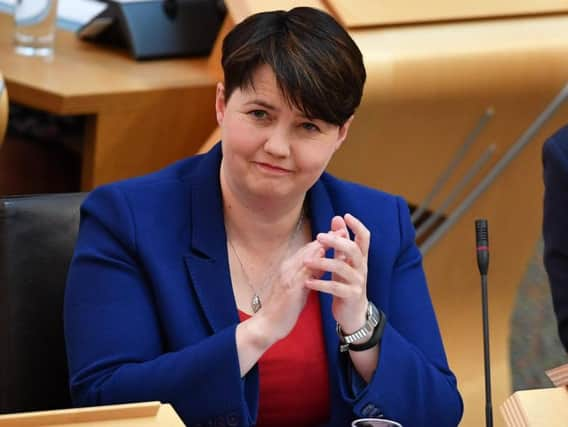Ruth Davidson reveals she'd die for her country - but not kill for it


The Scottish Conservative leader, who is an Honorary Colonel of her former British Army regiment, the 32 Signals, has said she now has a "pedestrian relationship" with death, but as a school pupil would have put her life on the line for her country.
Writing for the Unherd website, she says that in the year of John Smith's death, 1994, when she was still at Buckhaven high school in Fife , she first discussed the "bigger questions in life", adding: "I remember answering a question on military service with total assurance that, yes, I would be prepared to die for my country. But I wasn’t sure I’d be able to kill for it, which is a much harder thing to do."
Advertisement
Hide AdAdvertisement
Hide AdShe remembered those words years later, she says, when she completed her Territorial Army training "and was taught several dozen ways to kill – from calling in air support, to laying down 81mm mortar fire, to finding out why bayonets need a blood channel (so a sucking wound doesn’t make it impossible to withdraw it from the enemy to use again)."
Ms Davidson had signed up after she returned from Kosovo where she'd been covering the end of the war for the BBC, before she became a politician. It was, she says, "the first time I’d seen brain matter: the residue of a sniper’s bullet. It smelled cloyingly sweet. I was 22."
She has previously said that was also when decided to become a politician. “The job is to tell people what’s going on, it’s not always to change what’s going on, and that’s why you change sides. That’s why I changed sides.”
Her article in Unherd, also sees her write of her Presbyterian faith, and how it impressed upon her to cope with loss in ways that don't "make a show" as anything else could be seen as "emotional tourism". And she reflects on the first non-family funeral she attended; that of a 15-year-old classmate who died unexpectedly from an undiagnosed heart condition.
Writing about the impact of forensic anthropologist Dr Sue Black's memoir, in which she delves into the murders she had worked on as a Home Office expert and the war crimes she pieced together from unearthed mass graves in the Balkans, Ms Davidson says she is not afraid of dying.
"In fact, I almost did when I was very young; I was run over by a truck when I was only five. Hours of surgery followed, then weeks of treatment, months of rehabilitation, and a lifetime with scars and aches and body parts that don’t match.
"It’s not the idea of my own death I don’t like – if He came to sit beside me for a while, I like to think that I wouldn’t plead or bargain or upend my chair to get away. We would talk civilly. There would be no chummy chess match, but a bow of the head and an acceptance that every day since that first dodge all those years ago was an indulgence."
And she says she believes that social media has diluted people's attitudes to death, grief and sympathy. "The ‘RIP’ messages on Twitter for every pop star that passes or actor that leaves the stage hollows out the meaning of grief. That flowery prose – designed to be widely read – is no substitute for the awkward handshake and “thanks for coming” at the crematorium line-up. “Well, you know, he was a good man. And a good friend.”
Advertisement
Hide AdAdvertisement
Hide AdShe adds: "We all question, we all wrestle with the unfairness of a premature visit paid to someone we love, we are all hurt and we all die. But from first encounter to final resting place, the paths themselves are very different depending on our age, our religion, our culture."